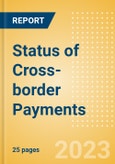Cross-border payments are an essential aspect of global trade and commerce, allowing businesses and individuals to transfer funds across different countries and currencies. Today, most cross-border payments are conducted through SWIFT (the Society for Worldwide Interbank Financial Telecommunication), which is a global messaging network that facilitates the exchange of payment messages between banks and financial institutions. However, over the last couple of years, several technological developments have challenged SWIFT’s hegemonic position. It is understanding these developments, and the impacts that they are having on cross-border payments, that is the main concern of this report.
Scope
- RTP systems are gaining popularity in the cross-border payments industry with the emergence of new players such as the Single Euro Payments Area (SEPA), P27, and Project Nexus. This trend is driven by the need for faster and more efficient payment processes, which traditional systems have struggled to provide.
- Open banking is expected to disrupt the cross-border payments industry by allowing third-party providers to access bank account data and initiate payments on behalf of customers. This will enable new entrants to enter the market and increase competition, leading to lower fees and better services for consumers.
- Central Bank Digital Currencies (CBDCs) are expected to play a significant role in the future of cross-border payments as more central banks around the world explore the possibilities of issuing digital currencies. CBDCs have the potential to streamline payment processes, reduce costs, and increase financial inclusion, but they also raise concerns around privacy and security.
Reasons to Buy
- Develop an in-depth understanding of the current state of cross-border payments.
- Understand the developments that are likely to have the biggest impact on cross-border payments in the near future.
- Learn which players have had the biggest impact on the sector.
Table of Contents
Companies Mentioned (Partial List)
A selection of companies mentioned in this report includes, but is not limited to:
- Wise
- PayPal
- P27
- Western Union
- SWIFT
- Ripple
- Moneygram
- BitPesa








